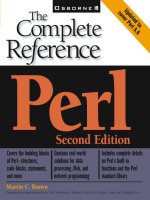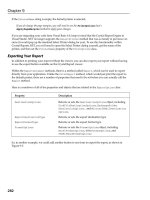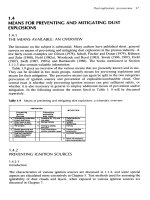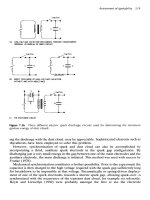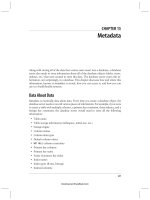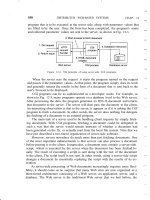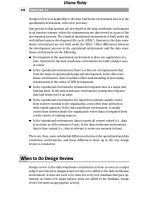perl the complete reference second edition phần 9 pdf
Bạn đang xem bản rút gọn của tài liệu. Xem và tải ngay bản đầy đủ của tài liệu tại đây (742.82 KB, 125 trang )
setgrent
setgrent
Sets (or resets) the enumeration to the beginning of the set of group entries. This
function should be called before the first call to getgrent.
Effects U
Returns in Scalar Context Returns in List Context
Nothing
See also Chapter(s) Function(s) Module(s)
Chapter 11 getgrent, endgrent Win32API::Net
sethostent
sethostent STAYOPEN
Sets (or resets) the enumeration to the beginning of the set of host entries. This function
should be called before the first call to gethostent. The STAYOPEN argument is
optional and unused on most systems.
Effects U
Returns in Scalar Context Returns in List Context
Nothing
See also Chapter(s) Function(s) Module(s)
Chapter 11 gethostent, endhostent
setnetent
setnetent STAYOPEN
Sets (or resets) the enumeration to the beginning of the set of network entries. This
function should be called before the first call to getnetent. The STAYOPEN argument
is optional and unused on most systems.
960
Perl: The Complete Reference
TEAMFLY
Team-Fly
®
Appendix A: Function Reference
961
APPENDIXES
Effects U
Returns in Scalar Context Returns in List Context
Nothing
See also Chapter(s) Function(s) Module(s)
Chapter 12 getnetent, endnetent
setpgrp
setpgrp PID, PGRP
Sets the current process group for the process PID. You can use a value of 0 for PID to
change the process group of the current process. If both arguments are omitted, defaults
to values of 0. Causes a fatal error if the system does not support the function.
Effects $!, XT, U
Returns in Scalar Context Returns in List Context
undef on failure
New parent process ID
See also Chapter(s) Function(s) Module(s)
Chapter 15 getpgrp
setpriority
setpriority WHICH, WHO, PRIORITY
Sets the priority for a process (PRIO_PROCESS), process group (PRIO_PGRP), or user
(PRIO_USER). The argument WHICH specifies what entity to set the priority for, and
WHO is the process ID or user ID to set. A value of 0 for WHO defines the current
process, process group, or user. Produces a fatal error on systems that don’t support
the system setpriority( ) function.
Effects $!, XT, U
Returns in Scalar Context Returns in List Context
0 on error
1 on success
See also Chapter(s) Function(s) Module(s)
Chapter 14 getpriority Win32::Process
setprotoent
setprotoent STAYOPEN
Sets (or resets) the enumeration to the beginning of the set of protocol entries. This
function should be called before the first call to getprotoent. The STAYOPEN
argument is optional and unused on most systems.
Effects U
Returns in Scalar Context Returns in List Context
Nothing
See also Chapter(s) Function(s) Module(s)
Chapter 12 getprotoent, endprotoent
setpwent
setpwent
Sets (or resets) the enumeration to the beginning of the set of password entries. This
function should be called before the first call to getpwent.
Effects U
Returns in Scalar Context Returns in List Context
Nothing
See also Chapter(s) Function(s) Module(s)
Chapter 11 getpwent, endpwent Win32API::Net
setservent
setservent STAYOPEN
Sets (or resets) the enumeration to the beginning of the set of service entries. This
function should be called before the first call to getservent. The STAYOPEN argument
is optional and unused on most systems.
962
Perl: The Complete Reference
Effects U
Returns in Scalar Context Returns in List Context
Nothing
See also Chapter(s) Function(s) Module(s)
Chapter 12 getservent, endservent
setsockopt
setsockopt SOCKET, LEVEL, OPTNAME, OPTVAL
Sets the socket option OPTNAME with a value of OPTVAL on SOCKET at the
specified LEVEL. You will need to import the Socket module for the valid values for
OPTNAME shown in Table A-13.
Appendix A: Function Reference
963
APPENDIXES
OPTNAME Description
SO_DEBUG Enable/disable recording of debugging information.
SO_REUSEADDR Enable/disable local address reuse.
SO_KEEPALIVE Enable/disable keep connections alive.
SO_DONTROUTE Enable/disable routing bypass for outgoing messages.
SO_LINGER Linger on close if data is present.
SO_BROADCAST Enable/disable permission to transmit broadcast messages.
SO_OOBINLINE Enable/disable reception of out-of-band data in band.
SO_SNDBUF Set buffer size for output.
SO_RCVBUF Set buffer size for input.
SO_TYPE Get the type of the socket (get only).
SO_ERROR Get and clear error on the socket (get only).
Table A-13.
Socket Options
964
Perl: The Complete Reference
Effects $!, XA, U
Returns in Scalar Context Returns in List Context
undef on failure
1 on success
See also Chapter(s) Function(s) Module(s)
Chapter 12 getsockopt, socket IO::Socket
shift
shift ARRAY
shift
Returns the first value in an array, deleting it and shifting the elements of the array list
to the left by one. If ARRAY is not specified, shifts the @_ array within a subroutine, or
@ARGV otherwise. shift is essentially identical to pop, except values are taken from
the start of the array instead of the end.
Effects None
Returns in Scalar Context Returns in List Context
undef if the array is empty
First element in the array
See also Chapter(s) Function(s) Module(s)
Chapter 8 pop, push, unshift IO::Socket
shmctl
shmctl ID, CMD, ARG
Controls the shared memory segment referred to by ID, using CMD with ARG.
You will need to import the IPC::SysV module to get the command tokens defined in
Table A-14.
Appendix A: Function Reference
965
APPENDIXES
Effects $!, U
Returns in Scalar Context Returns in List Context
undef on failure
0 but true if the return value from the
shmctl( ) is 0
Value returned by system
See also Chapter(s) Function(s) Module(s)
Chapter 14 shmget, shmread IPC::SysV
shmget
shmget KEY, SIZE, FLAGS
shmget KEY
Returns the shared memory segment ID for the segment matching KEY. A new shared
memory segment is created of at least SIZE bytes, providing that either KEY does not
Command Description
IPC_STAT Places the current value of each member of the data structure
associated with ID into the scalar ARG
IPC_SET Sets the value of the following members of the data structure
associated with ID to the corresponding values found in the
packed scalar ARG
IPC_RMID Removes the shared memory identifier specified by ID from
the system and destroys the shared memory segment and
data structure associated with it
SHM_LOCK Locks the shared memory segment specified by ID in memory
SHM_UNLOCK Unlocks the shared memory segment specified by ID
Table A-14.
Commands for Controlling Shared Memory Segments
966
Perl: The Complete Reference
already have a segment associated with it or that KEY is equal to the constant
IPC_PRIVATE.
Effects $!, U
Returns in Scalar Context Returns in List Context
Shared memory ID
See also Chapter(s) Function(s) Module(s)
Chapter 14 shmctl, shmread, shmwrite IPC::SysV
shmread
shmread ID, VAR, POS, SIZE
Reads the shared memory segment ID into the scalar VAR at position POS for up to
SIZE bytes.
Effects $!, U
Returns in Scalar Context Returns in List Context
0 on failure
1 on success
See also Chapter(s) Function(s) Module(s)
Chapter 14 shmctl, shmget, shmwrite IPC::SysV
shmwrite
shmwrite ID, STRING, POS, SIZE
Writes STRING from the position POS for SIZE bytes into the shared memory
segment specified by ID. The SIZE is greater than the length of STRING. shmwrite
appends null bytes to fill out to SIZE bytes.
Appendix A: Function Reference
967
APPENDIXES
Effects $!, U
Returns in Scalar Context Returns in List Context
0 on false
1 on success
See also Chapter(s) Function(s) Module(s)
Chapter 14 shmctl, shmget, shmread IPC::SysV
shutdown
shutdown SOCKET, HOW
Disables a socket connection according to the value of HOW. The valid values for
HOW are identical to the system call of the same name. A value of 0 indicates that you
have stopped reading information from the socket. A value of 1 indicates that you’ve
stopped writing to the socket. A value of 2 indicates that you have stopped using the
socket altogether.
Effects $!, XA, U
Returns in Scalar Context Returns in List Context
0 on failure
1 on success
See also Chapter(s) Function(s) Module(s)
Chapter 12 accept IO::Socket
sin
sin EXPR
sin
968
Perl: The Complete Reference
Returns the sine of EXPR, or $_ if not specified.
Effects $_
Returns in Scalar Context Returns in List Context
Floating point
See also Chapter(s) Function(s) Module(s)
Chapter 8 atan2, cos Math::Trig
sleep
sleep EXPR
sleep
Pauses the script for EXPR seconds, or forever if EXPR is not specified. Returns the
number of seconds actually slept. Can be interrupted by a signal handler, but you
should avoid using sleep with alarm, since many systems use alarm for the sleep
implementation.
Effects None
Returns in Scalar Context Returns in List Context
Integer, number of seconds actually slept
See also Chapter(s) Function(s) Module(s)
Chapter 14 alarm, select IO::Select
socket
socket SOCKET, DOMAIN, TYPE, PROTOCOL
Opens a socket in DOMAIN, of TYPE, using PROTOCOL, and attaches it to the
filehandle SOCKET. You will need to import the Socket module to get the correct
definitions. For most systems, DOMAIN will be PF_INET for a TCP/IP-based socket.
TYPE will generally be one of SOCK_STREAM for streams-based connections
(TCP/IP) or SOCK_DGRAM for a datagram connection (UDP/IP). Values for
PROTOCOL are system defined, but valid values include TCP for TCP/IP, UDP for
UDP, and RDP for the “reliable” datagram protocol.
Appendix A: Function Reference
969
APPENDIXES
Consider using the IO::Socket module instead to create both client and server
sockets, since it handles all of this detail for you.
Effects $!, XA, XT, U
Returns in Scalar Context Returns in List Context
0 on failure
1 on success
See also Chapter(s) Function(s) Module(s)
Chapter 12 accept, bind IO::Socket
socketpair
socketpair SOCKET1, SOCKET2, DOMAIN, TYPE, PROTOCOL
Creates an unnamed pair of connected sockets in the specified DOMAIN, of the
specified TYPE, using PROTOCOL. If the system socketpair( ) function is not
implemented, then it causes a fatal error.
Effects $!, XA, XT, U
Returns in Scalar Context Returns in List Context
0 on failure
1 on success
See also Chapter(s) Function(s) Module(s)
Chapter 12 pipe, socket IPC::Open2, IPC::Open3,
IO::Socket
sort
sort SUBNAME LIST
sort BLOCK LIST
sort LIST
Sorts LIST according to the subroutine SUBNAME or the anonymous subroutine
specified by BLOCK. If no SUBNAME or BLOCK is specified, then it sorts according
to normal alphabetical sequence. If BLOCK or SUBNAME is specified, then the
970
Perl: The Complete Reference
subroutine should return an integer less than, greater than, or equal to zero, according
to how the elements of the array are to be sorted.
Effects $@
Returns in Scalar Context Returns in List Context
List
See also Chapter(s) Function(s) Module(s)
Chapter 8 reverse
splice
splice ARRAY, OFFSET, LENGTH, LIST
splice ARRAY, OFFSET, LENGTH
splice ARRAY, OFFSET
Removes the elements of ARRAY from the element OFFSET for LENGTH elements,
replacing the elements removed with LIST, if specified. If LENGTH is omitted,
removes everything from OFFSET onwards.
Effects $@
Returns in Scalar Context Returns in List Context
undef if no elements removed
Last element removed
Empty list on failure
List of elements removed
See also Chapter(s) Function(s) Module(s)
Chapter 8 substr, map, grep
split
split /PATTERN/, EXPR, LIMIT
split /PATTERN/, EXPR
split /PATTERN/
split
Splits a string into an array of strings, returning the resultant list. By default, empty
leading fields are preserved and empty trailing fields are deleted.
TEAMFLY
Team-Fly
®
In a scalar context, returns the number of fields found and splits the values into the
@_ array using ?? as the pattern delimiter. If EXPR is omitted, splits the value of $_. If
PATTERN is also omitted, it splits on white space (multiple spaces, tabs). Anything
matching PATTERN is taken to be a delimiter separating fields and can be a regular
expression of one or more characters.
If LIMIT has been specified and is positive, splits into a maximum of that many
fields (or fewer). If LIMIT is unspecified or zero, splitting continues until there are no
more delimited fields. If negative, then split acts as if an arbitrarily large value has
been specified, preserving trailing null fields.
A PATTERN of a null string splits EXPR into individual characters.
Effects $_, T
Returns in Scalar Context Returns in List Context
Integer, number of elements List of split elements
See also Chapter(s) Function(s) Module(s)
Chapter 8 join
sprintf
sprintf FORMAT, LIST
The sprintf function uses FORMAT to return a formatted string based on the values in
LIST. Essentially identical to printf, but the formatted string is returned instead of
being printed. The sprintf function is basically synonymous with the C sprintf
function, but Perl does its own formatting; the C sprintf function is not used (except for
basic floating-point formatting).
The sprintf function accepts the same format conversions as printf (see Table A-10).
Perl also supports flags that optionally adjust the output format. These are specified
between the % and conversion letter and are the same as those for printf (see Table A-11).
Effects None
Returns in Scalar Context Returns in List Context
undef on error
Preformatted string according to
FORMAT and LIST
See also Chapter(s) Function(s) Module(s)
Chapters 7, 8 print, printf
Appendix A: Function Reference
971
APPENDIXES
972
Perl: The Complete Reference
sqrt
sqrt EXPR
sqrt
Returns the square root of EXPR, or $_ if omitted.
Effects $_, $@
Returns in Scalar Context Returns in List Context
Floating point number
See also Chapter(s) Function(s) Module(s)
Chapter 8
srand
srand EXPR
srand
Sets the seed value for the random number generator to EXPR or to a random value
based on the time, process ID, and other values if EXPR is omitted.
Effects None
Returns in Scalar Context Returns in List Context
Nothing
See also Chapter(s) Function(s) Module(s)
Chapter 8 rand
stat
stat FILEHANDLE
stat EXPR
stat
Returns a 13-element array giving the status info for a file, specified by either
FILEHANDLE, EXPR, or $_. The list of values returned is shown in Table A-15. If used
in a scalar context, returns 0 on failure, 1 on success. Note that support for some of
these elements is system dependent—check the documentation for a complete list.
Effects $_, $!, XA
Returns in Scalar Context Returns in List Context
0 on failure in scalar context
1 on success in scalar context
Empty list on failure
List of file statistics (see table)
See also Chapter(s) Function(s) Module(s)
Chapter 7 -X, lstat
Appendix A: Function Reference
973
APPENDIXES
Element Description
0 Device number of file system
1 Inode number
2 File mode (type and permissions)
3 Number of (hard) links to the file
4 Numeric user ID of file’s owner
5 Numeric group ID of file’s owner
6 The device identifier (special files only)
7 File size, in bytes
8 Last access time since the epoch
9 Last modify time since the epoch
10 Inode change time (not creation time!) since the epoch
11 Preferred block size for file system I/O
12 Actual number of blocks allocated
Table A-15.
Values Returned by stat
974
Perl: The Complete Reference
study
study EXPR
study
Takes extra time to study EXPR in order to improve the performance on regular
expressions conducted on EXPR. If EXPR is omitted, uses $_. The actual speed gains
may be very small, depending on the number of times you expect to search the string.
You can only study one expression or scalar at any one time.
Effects $_
Returns in Scalar Context Returns in List Context
Nothing
See also Chapter(s) Function(s) Module(s)
Chapter 8 m//, s/// re
sub
sub NAME PROTO ATTRS BLOCK# Named, prototype, attributes, definition
sub NAME ATTRS BLOCK # Named, attributes, definition
sub NAME PROTO BLOCK # Named, prototype, definition
sub NAME BLOCK # Named, definition
sub NAME PROTO ATTRS # Named, prototype, attributes
sub NAME ATTRS # Named, attributes
sub NAME PROTO # Named, prototype
sub NAME # Named
sub PROTO ATTRS BLOCK # Anonymous, prototype, attributes, definition
sub ATTRS BLOCK # Anonymous, attributes, definition
sub PROTO BLOCK # Anonymous, prototype, definition
sub BLOCK # Anonymous, definition
The sub keyword defines a new subroutine. The arguments shown above follow
these rules:
■
NAME is the name of the subroutine. Named subroutines can be predeclared
(without an associated code block) with, or without, prototype specifications.
■
Anonymous subroutines must have a definition.
■
PROTO defines the prototype for a function, which will be used when the
function is called to validate the supplied arguments.
■
ATTRS define additional information for the parser about the subroutine
being declared.
Effects None
Returns in Scalar Context Returns in List Context
Nothing
See also Chapter(s) Function(s) Module(s)
Chapter 7 prototype
substr
substr EXPR, OFFSET, LEN, REPLACEMENT
substr EXPR, OFFSET, LEN
substr EXPR, OFFSET
Returns a substring of EXPR, starting at OFFSET within the string. If OFFSET is
negative, starts that many characters from the end of the string. If LEN is specified,
returns that number of bytes, or all bytes up until end-of-string if not specified. If LEN
is negative, leaves that many characters off the end of the string. If REPLACEMENT is
specified, replaces the substring with the REPLACEMENT string.
If you specify a substring that passes beyond the end of the string, it returns only
the valid element of the original string.
Effects $@, XA, XR
Returns in Scalar Context Returns in List Context
String
See also Chapter(s) Function(s) Module(s)
Chapter 8 splice, m//
symlink
symlink OLDFILE, NEWFILE
Appendix A: Function Reference
975
APPENDIXES
Creates a symbolic link between OLDFILE and NEWFILE. On systems that don’t
support symbolic links, causes a fatal error.
Effects $!, XT, U
Returns in Scalar Context Returns in List Context
0 on failure
1 on success
See also Chapter(s) Function(s) Module(s)
Chapter 7 link, lstat
syscall
syscall EXPR, LIST
Calls the system function EXPR with the arguments LIST. Produces a fatal error if the
specified function does not exist.
Effects $!, XR, XT, U
Returns in Scalar Context Returns in List Context
-1 on failure of system call
Value returned by system function
See also Chapter(s) Function(s) Module(s)
Chapter 14
sysopen
sysopen FILEHANDLE, FILENAME, MODE, PERMS
sysopen FILEHANDLE, FILENAME, MODE
Equivalent to the underlying C and operating system call open( ). Opens the file
specified by FILENAME, associating it with FILEHANDLE. The MODE argument
specifies how the file should be opened. The values of MODE are system dependent,
but some values are historically set. Values of 0, 1, and 2 mean read-only, write-only,
and read/write, respectively. The supported values are available in the Fcntl module,
and are summarized in Table A-16. Note that FILENAME is strictly a file name; no
interpretation of the contents takes place (unlike open), and the mode of opening is
defined by the MODE argument.
976
Perl: The Complete Reference
If the file has to be created, and the O_CREAT flag has been specified in MODE,
then the file is created with the permissions of PERMS. The value of PERMS must be
specified in traditional Unix-style hexadecimal. If PERMS is not specified, then Perl
uses a default mode of 0666 (read/write on user/group/other).
Effects $!, XA
Returns in Scalar Context Returns in List Context
0 on failure
1 on success
See also Chapter(s) Function(s) Module(s)
Chapter 7 sysread, syswrite, sysseek Fcntl, IO::File, IO::Handle
Appendix A: Function Reference
977
APPENDIXES
Flag Description
O_RDONLY Read only.
O_WRONLY Write only.
O_RDWR Read and write.
O_CREAT Create the file if it doesn’t already exist.
O_EXCL Fail if the file already exists.
O_APPEND Append to an existing file.
O_TRUNC Truncate the file before opening.
O_NONBLOCK Non-blocking mode.
O_NDELAY Equivalent of O_NONBLOCK.
O_SYNC Write data physically to the disk, instead of write buffer.
O_EXLOCK Lock using flock and LOCK_EX.
O_SHLOCK Lock using flock and LOCK_SH.
O_DIRECTOPRY Fail if the file is not a directory.
O_NOFOLLOW Fail if the last path component is a symbolic link.
O_BINARY Open in binary mode (implies a call to binmode).
O_LARGEFILE Open with large (>2GB) file support.
O_NOCTTY Don’t make the terminal file being opened the processes-
controlling terminal, even if you don’t have one yet.
Table A-16.
Modes for Opening Files with sysopen
978
Perl: The Complete Reference
sysread
sysread FILEHANDLE, SCALAR, LENGTH, OFFSET
sysread FILEHANDLE, SCALAR, LENGTH
Tries to read LENGTH bytes from FILEHANDLE, placing the result in SCALAR. If
OFFSET is specified, then data is written to SCALAR from OFFSET bytes, effectively
appending the information from a specific point. If OFFSET is negative, it starts from
the number of bytes specified counted backward from the end of the string. This is the
equivalent of the C/operating system function read( ). Because it bypasses the buffering
system employed by functions like print, read, and seek, it should only be used with
the corresponding syswrite and sysseek functions.
Effects $!, $@, T, XA, XR
Returns in Scalar Context Returns in List Context
undef on error
0 at end of file
Integer, number of bytes read
See also Chapter(s) Function(s) Module(s)
Chapter 7 syswrite, sysseek IO::File, IO::Handle
sysseek
sysseek FILEHANDLE,POSITION,WHENCE
Sets the position within FILEHANDLE according to the values of POSITION
and WHENCE. This function is the equivalent of the C function lseek( ), so you
should avoid using it with buffered forms of FILEHANDLE. This includes the
<FILEHANDLE> notation and print, write, seek, and tell. Using it with sysread
or syswrite is OK, since they too ignore buffering.
The position within the file is specified by POSITION, using the value of
WHENCE as a reference point, as shown in Table A-17.
Appendix A: Function Reference
979
APPENDIXES
Effects $!, XA
Returns in Scalar Context Returns in List Context
undef on failure
A position of 0 is returned as
the string 0 but true
Integer, new position (in bytes) on success
See also Chapter(s) Function(s) Module(s)
Chapter 7 tell, seek IO::File, IO::Handle
system
system PROGRAM, LIST
system PROGRAM
Executes the command specified by PROGRAM, passing LIST as arguments to the
command. The script waits for execution of the child command to complete before
continuing. If PROGRAM is the only argument specified, then Perl checks for any
shell metacharacters and, if found, passes PROGRAM unchanged to the user’s default
command shell. If there are no metacharacters, then the value is split into words and
passed as an entire command with arguments to the system execvp function.
Value Constant Description
0 SEEK_SET Sets the new position absolutely to POSITION bytes
within the file
1 SEEK_CUR Sets the new position to the current position plus
POSITION bytes within the file
2 SEEK_END Sets the new position to POSITION bytes, relative to
the end of the file
Table A-17.
Offset Values and Constants for seek
The return value is the exit status of the program as returned by the wait function.
To obtain the actual exit value, divide by 256. If you want to capture the output from a
command, use the backticks operator.
Effects $!, $?, XT
Returns in Scalar Context Returns in List Context
Exit status of program as returned by wait
See also Chapter(s) Function(s) Module(s)
Chapter 14 exec
syswrite
syswrite FILEHANDLE, SCALAR, LENGTH, OFFSET
syswrite FILEHANDLE, SCALAR, LENGTH
Attempts to write LENGTH bytes from SCALAR to the file associated with
FILEHANDLE. If OFFSET is specified, then information is read from OFFSET bytes in
the supplied SCALAR. This function uses the C/operating system write( ) function,
which bypasses the normal buffering. You should therefore avoid using functions such
as print and read in conjunction with this function.
Effects $!, $@, XA
Returns in Scalar Context Returns in List Context
undef on error
Integer, number of bytes written
See also Chapter(s) Function(s) Module(s)
Chapter 7 sysread, sysseek IO::File, IO::Handle
tell
tell FILEHANDLE
tell
Returns the current position (in bytes) within the specified FILEHANDLE. If
FILEHANDLE is omitted, then it returns the position within the last file accessed.
980
Perl: The Complete Reference
TEAMFLY
Team-Fly
®
Effects XA
Returns in Scalar Context Returns in List Context
Integer, current file position (in bytes)
See also Chapter(s) Function(s) Module(s)
Chapter 7 seek, sysseek IO::File, IO::Handle
telldir
telldir DIRHANDLE
Returns the current position within the directory listing referred to by DIRHANDLE.
Effects XA, U
Returns in Scalar Context Returns in List Context
Integer
See also Chapter(s) Function(s) Module(s)
Chapter 7 opendir, readdir, closedir IO::Dir
tie
tie VARIABLE, CLASSNAME, LIST
Ties the VARIABLE to the package class CLASSNAME that provides implementation
for the variable type. Any additional arguments in LIST are passed to the constructor
for the entire class. Typically used to bind hash variables to DBM databases.
Effects $@
Returns in Scalar Context Returns in List Context
Reference to tied object
See also Chapter(s) Function(s) Module(s)
Chapter 10 tied, untie Tie::Array, Tie::Handle,
Tie::Hash, Tie::RefHash,
Tie::Scalar, Tie::SubstrHash
APPENDIXES
Appendix A: Function Reference
981
tied
tied VARIABLE
Returns a reference to the object underlying the tied entity VARIABLE.
Effects None
Returns in Scalar Context Returns in List Context
undef if VARIABLE is not tied to a
package
See also Chapter(s) Function(s) Module(s)
Chapter 10 tie, untie Tie::Array, Tie::Handle,
Tie::Hash, Tie::RefHash,
Tie::Scalar, Tie::SubstrHash
time
time
Returns the number of seconds since the epoch (00:00:00 UTC, January 1, 1970, for
most systems; 00:00:00, January 1, 1904, for Mac OS). Suitable for feeding to gmtime
and localtime.
Effects None
Returns in Scalar Context Returns in List Context
Integer, seconds since epoch
See also Chapter(s) Function(s) Module(s)
Chapter 11 gmtime, localtime
times
times
Returns a four-element list giving the user, system, child, and child system times for
the current process and its children.
982
Perl: The Complete Reference
Effects None
Returns in Scalar Context Returns in List Context
User, system, child, child system
times as integer
See also Chapter(s) Function(s) Module(s)
Chapter 11
tr///
tr/SEARCHLIST/REPLACEMENTLIST/
Not a function. This is the transliteration operator; it replaces all occurrences of the
characters in SEARCHLIST with the characters in REPLACEMENTLIST.
Effects XR
Returns in Scalar Context Returns in List Context
Number of characters replaced or deleted
See also Chapter(s) Function(s) Module(s)
Chapter 8 m//, s///
truncate
truncate FILEHANDLE, LENGTH
Truncates (reduces) the size of the file specified by FILEHANDLE to the specified
LENGTH (in bytes). Produces a fatal error if the function is not implemented on
your system.
Effects $!, XA, XT, U
Returns in Scalar Context Returns in List Context
undef if the operation failed
1 on success
See also Chapter(s) Function(s) Module(s)
Chapter 7 open, sysopen IO::File, IO::Handle
Appendix A: Function Reference
983
APPENDIXES
uc
uc EXPR
uc
Returns an uppercased version of EXPR, or $_ if not specified.
Effects $_, T
Returns in Scalar Context Returns in List Context
String
See also Chapter(s) Function(s) Module(s)
Chapter 8 lc, lcfirst, ucfirst
ucfirst
ucfirst EXPR
ucfirst
Returns the value of EXPR with only the first character uppercased. If EXPR is omitted,
then uses $_.
Effects $_, T
Returns in Scalar Context Returns in List Context
String
See also Chapter(s) Function(s) Module(s)
Chapter 8 lc, lcfirst, uc
umask
umask EXPR
umask
Sets the umask (default mask applied when creating files and directories) for the
current process. Value of EXPR must be an octal number. If EXPR is omitted, simply
returns the previous value.
984
Perl: The Complete Reference

